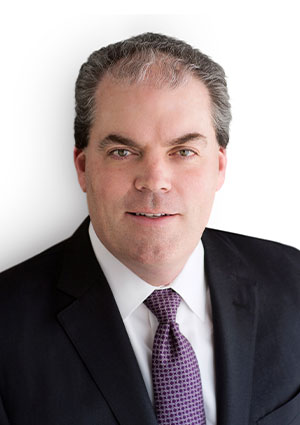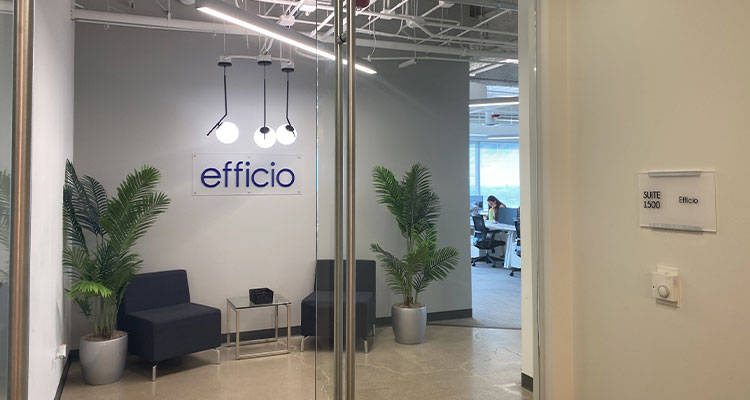Patrick Traynor on how Efficio is helping customers to build supply chain resiliency in the face of global disruption
Given the vast disruption and operational challenges of the last few years, it’s great to see supply chain and procurement occupy a position at the forefront of CEOs’ minds and even public conversation,” opens Patrick Traynor, Vice President for North America at Efficio. “We’re seeing more interest in supply chain at a university level, both among university students and institutions driving improvements to subject courses, and it’s exciting to see the innovation and ideas emerging as new talent rises through the ranks.”
With more than 20 years of experience in procurement transformation, strategic sourcing strategy, and supply chain optimization, Patrick has helped companies achieve optimal results across several industries including financial services, utilities, and manufacturing. As the Vice President of Efficio’s North American division, Patrick oversees the region’s operations with a focus on growth and efficiency, while also aiding the personal development of his teams.
“My journey into Efficio was unique in that I kept in close contact with the founders of Efficio throughout my career, having been colleagues while working at Kearney, a global, operationally focused management consulting firm,” Patrick narrates. “Efficio was established in 2000 and was initially focused on the UK market with later expansion within Europe. The founders identified a gap in the market for an expert procurement firm, but the business today has evolved into supply chain, working with customers to improve procurement performance and achieve a variety of goals from cost savings to building capabilities.

“Personally, my career background begins with an engineering degree, which led me into a technical consulting role, and after completing an MBA, I joined Kearney and moved to their London office and gained my first real experience in procurement and supply chain. My wife and I then decided to return home to the US, and I went on to work for a procurement services startup for a few years before starting my own consulting firm.
“Efficio had grown over the years and in 2016, the business received external venture funding to help fuel geographic expansion focused on North America and the Middle East. As I’d worked closely with the founders in a partnership context, it was a logical step for me to come onboard with the vision of heading up the North American division to secure Efficio’s presence in the region.
“My day-to-day North American responsibilities typically fall into one of three categories: developing business through sales, ensuring we consistently deliver high-quality work, and growing our team. At a broader level, I sit on the Board, so I also help the executive team to make decisions and oversee operations. My average day could be talking directly with customers, reviewing our teams’ work, or coaching employees.”
Global operation
Today, Efficio boasts more than 1400 professionals globally, and is organized around three regions: North America, Europe, and the Middle East. “In North America specifically, we started with an office in New York and opened a second office in Chicago around two weeks before the Covid-19 pandemic saw everything temporarily close,” Patrick explains. “We’ve experienced tremendous growth across the region and have recently announced the opening of an office in Mexico City.
“Many consultancies pride themselves on their culture, and Efficio is no exception. Our culture is built on high-quality, empowered people, and although we’re a global organization in terms of how we organize our business units, we’re a collaborative team often working with colleagues across the globe to solve clients’ problems.
“However, as an expert firm that works in collaboration with our customers, our objectives of improving performance in procurement and supply chain operations remain the same since our inception. We identify strategic improvement opportunities and then work side-by-side at all levels of the organization to drive the change required to make the improvements.”
Having faced several issues and disruptions over the last few years, companies are striving to create more robust supply chains. “It feels like disruptions have occurred globally, one after another in recent years, and it’s reasonable to assume that while no one can predict the next challenge, there will certainly be one around the corner,” Patrick proffers. “To navigate these issues, businesses must build resilience across the supply chain, but what exactly does that look like?
“We’re seeing clients focus on finding alternative sources, for instance, whether through sourcing additional partnerships, dual sourcing, or even nearshoring. In years past, there was an industry push to move manufacturing to low-cost regions like China. There has been a progressive shift towards companies reverting to having multiple options within their supply network, which has been accelerated by recent disruptions. For those that have moved manufacturing offshore, there’s a trend towards nearshoring, reshoring, and insourcing.
“Companies must embrace a diversification strategy within their supply chain to ensure that they are not dependent on one location or region in the event of future disruption. We’re also seeing clients deepen their collaboration with suppliers to improve their positioning as a key customer. There’s not a single answer, and perhaps the most robust supply chains will be those that adopt a multi-pronged strategy that suits their individual requirements. It’s also important to remember that these investments don’t necessarily result in immediate cost reductions, so the key lies in finding the right balance of building resilience without building in too much cost.”
Constant evolution
From our conversation, it’s clear that Patrick has successfully navigated the supply chain and procurement industry’s myriad changes and developments over the course of his career. At the helm of Efficio’s North American operations, Patrick will continue to drive growth within the region through collaboration and strategic partnerships.
As we come to an end, Patrick shares his thoughts about the industry’s future: “The field of technology is constantly evolving as companies identify the best applications for leveraging AI to drive efficiency in their supply chains. One of the most impactful applications of AI is managing large data sets to enable better data analysis and assist with decision making, as well as improving the accuracy of demand forecasting. Aside from AI, there are also some significant improvements being leveraged by adopting physical automation in manufacturing operations.
“AI tools are certainly going to play a key part in the future of supply chain optimization and will accelerate the effectiveness of several processes like decision making. We’ll see a continuation of current trends as the supply chain sector continues to evolve, but many of the questions around the future are uncertain, depending on the status of the global geopolitical environment.
“I’m generally excited and optimistic about the future though, especially now that supply chain and procurement are prominent topics not only in the public eye, but more importantly in the eyes of CEOs,” Patrick concludes. “There’s more interest in these fields, and I’m excited to see new innovations, increased resources, and continued investment as fresh talent emerges around the globe.”
